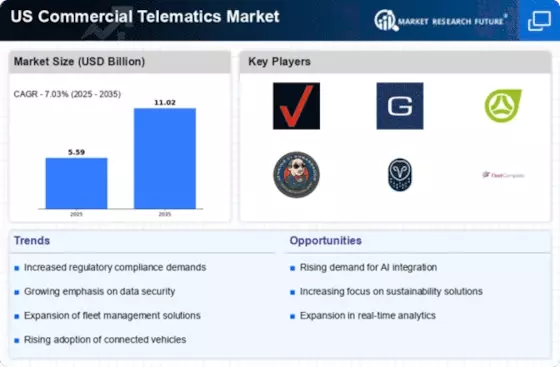Advancements in Data Analytics and AI
The integration of advanced data analytics and artificial intelligence (AI) within the US Commercial Telematics Market is transforming how businesses operate. These technologies enable companies to analyze vast amounts of data generated by telematics systems, leading to actionable insights that can enhance decision-making processes. For instance, predictive analytics can forecast maintenance needs, thereby reducing downtime and associated costs. The market is witnessing a shift towards AI-driven solutions that can optimize routes, improve fuel efficiency, and enhance driver behavior. As organizations increasingly rely on data-driven strategies, the demand for telematics solutions that incorporate these advanced technologies is expected to rise. This trend indicates a promising future for the US Commercial Telematics Market, as businesses seek to harness the power of data to drive operational excellence.
Rising Focus on Safety and Compliance
Safety and regulatory compliance are paramount concerns within the US Commercial Telematics Market. With increasing scrutiny from regulatory bodies, companies are compelled to adopt telematics solutions that ensure adherence to safety standards and regulations. The implementation of electronic logging devices (ELDs) has become mandatory for commercial vehicle operators, driving the adoption of telematics systems that facilitate compliance. Furthermore, telematics solutions provide real-time monitoring of driver behavior, enabling organizations to implement safety programs that reduce accidents and enhance overall safety. As the emphasis on safety and compliance continues to grow, the US Commercial Telematics Market is likely to see an uptick in demand for solutions that address these critical needs, ultimately fostering a safer transportation environment.
Growing Demand for Fleet Management Solutions
The US Commercial Telematics Market is experiencing a notable surge in demand for fleet management solutions. Companies are increasingly recognizing the value of telematics in optimizing fleet operations, enhancing efficiency, and reducing operational costs. According to recent data, the market for fleet management solutions is projected to grow at a compound annual growth rate (CAGR) of approximately 15% over the next five years. This growth is driven by the need for real-time tracking, route optimization, and improved driver safety. As businesses strive to enhance productivity and minimize expenses, the integration of telematics into fleet management systems becomes essential. The US Commercial Telematics Market is thus positioned to benefit significantly from this trend, as organizations seek to leverage technology to gain a competitive edge.
Integration of Telematics with Autonomous Vehicles
The US Commercial Telematics Market is on the brink of a transformative phase with the integration of telematics systems into autonomous vehicles. As the development of autonomous driving technology accelerates, telematics plays a crucial role in facilitating communication between vehicles and infrastructure. This integration enhances operational efficiency, safety, and data collection capabilities. Companies are increasingly investing in telematics solutions that support the deployment of autonomous fleets, which are expected to revolutionize logistics and transportation sectors. The potential for reduced labor costs and improved delivery times positions the US Commercial Telematics Market favorably in the context of this technological evolution. As autonomous vehicles become more prevalent, the demand for sophisticated telematics solutions is anticipated to rise, further shaping the market landscape.
Increased Investment in Smart Transportation Infrastructure
The US Commercial Telematics Market is benefiting from increased investment in smart transportation infrastructure. Government initiatives aimed at modernizing transportation systems are driving the adoption of telematics solutions that enhance connectivity and efficiency. Investments in smart traffic management systems, connected roadways, and vehicle-to-everything (V2X) communication are creating a conducive environment for telematics growth. These advancements not only improve traffic flow but also provide valuable data for fleet operators to optimize their operations. As cities and states prioritize smart infrastructure projects, the US Commercial Telematics Market is likely to experience a surge in demand for innovative telematics solutions that align with these initiatives, ultimately contributing to a more efficient and sustainable transportation ecosystem.
















